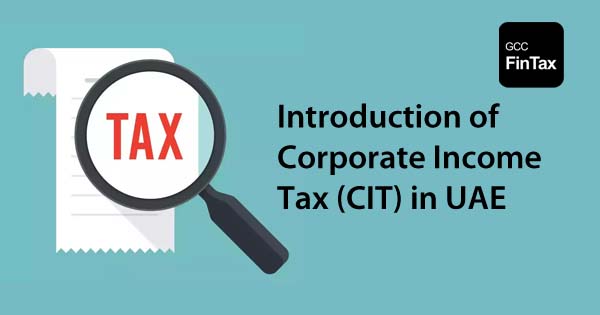
As tax professionalshave been expecting, Ministry of Finance,UAEhas announced the introduction of Corporate Income Tax (CIT) on 31stJanuary 2022. While the introduction is the result of OECDs BEPS 2.0 Pillar 2 (Global Minimum Tax Rules) initiative, based on FAQ’s, one can infer that the regulations are going to provide significant reliefs/exemptions to retain its status as international hub for investments.
Let’s look into some of the key implications:
CIT is going to be a Federal Tax similar to VAT and Excise except for businesses engaged in extraction of natural resources which will continue to be under Emirate level taxation system. Federal Tax Authority will be the responsible body for the administration, collection, and enforcement of CIT.
CIT regime will become effective for financial years starting on or after 1stJune 2023.
Effectively, if financial year of a business entity starts on 1stJanuary 2023 then the first tax year will be for the period from 1stJanuary 2024 to 31stDecember 2024. For businesses, the financial year starts after 1stJune 2023, the first tax year starts from 1stJuly 2023.
|
Taxable Income |
CIT Rate |
|
AED 0 – 375,000 |
0% |
|
Above AED 375,000 |
9% |
A different tax rate will be applicable for MNE’s group that meet the conditions set under BEPS 2.0 Pillar 2 regulations. For easy reference, MNE groups will be under the ambit of BEPS 2.0 Pillar 2 (Global Minimum tax) when the consolidated group revenue is more than EUR 750 million in two (2) out of last four (4) financial years.
IIR (Income Inclusion Rules, which grant parent jurisdiction a right to levy top up tax) of BEPS 2.0 Pillar 2 are expected to be effective from 1stJanuary 2023. Considering these rules, we can expect UAE to consider 15% CIT rate for MNE groups that are subjected to BEPS 2.0 Pillar 2 rules.
CIT will be payable on accounting net profit as per the financial statements prepared in accordance with acceptable international accounting standards after making the necessary adjustments for tax purpose. These adjustments could be in the nature of depreciation differences, provisions, unrealized exchange gain/loss etc.
In general, expenses incurred in the ordinary course of business would be allowed as tax deduction. However, there might be restrictions around the expenses, which are in the nature of personal use, bad debts, donations, fines, penalties, tax cost, dividends, interest etc.
No withholding tax shall be applied on both domestic and cross border payments.
Tax paid in foreign jurisdictions will be offered as credit. Cases where UAE has double tax treaty, the credit may be in accordance with the treaty rules. The regulations might provide further guidance on the method of offering the credit as unilateral relief for taxes paid in jurisdictions with which UAE don’t have double tax treaty i.e. Exemption vs. credit method
Like any other matured tax market, CIT regulations will have the grouping reliefs subject to certain conditions:
Businesses will be subjected to transfer pricing obligations in accordance with OECD guidance on Transfer pricing. As per OECD transfer pricing guidelines, the transactions between related parties must meet the arm’s length principle by applying the most appropriate method of justification. Businesses might also be subjected to three (3) tier transfer pricing documentation and an additional transfer pricing declaration might be required to be included as part of annual tax return similar to other GCC countries.
While MNEs group with more than EUR 750 million are already subject to CbCR regulations in UAE and may require to have Master file in accordance with any other jurisdictional tax requirement.
Further clarify might be provided in the CIT law about the applicability of transfer pricing regulations on domestic transactions.
In general,carry forward of business losses is permitted subject to certain conditions. Like many jurisdictions, UAE might have the following conditions to avoid tax abuse.
The regulations might provide clarity about carry back and timeframe for carry back/forward. Generally, depreciation related losses are allowed to be carried forward indefinitely in many jurisdictions and UAE may adopt similar practice.
With one return on annual basis, the tax compliance obligationsare kept at minimal level to ensure the easy of doing business in UAE. There would not be any requirement of paying tax on advance basis or submission of provisional tax returns.
Disclaimer: Content posted is for informational & knowledge sharing purposes only, and is not intended to be a substitute for professional advice related to tax, finance or accounting. The view/interpretation of the publisher is based on the available Law, guidelines and information. Each reader should take due professional care before you act after reading the contents of that article/post. No warranty whatsoever is made that any of the articles are accurate and is not intended to provide, and should not be relied on for tax or accounting advice.
You can access Law including Guidelines, Cabinet & FTA Decisions, Public Clarifications, Forms, Business Bulletins for all taxes (Vat, Excise, Customs, Corporate Tax, Transfer Pricing) for all GCC Countries in the Law Section of GCC FinTax